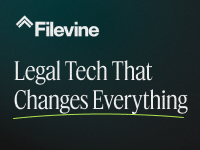You’d think that someone who graduated from an Ivy League law school would know the difference between ripeness and standing. But you’d probably also think that the Hatch Act barred government employees, whose salaries are paid with your tax dollars, from openly campaigning for a political candidate. This is 2020, though, so you’d be wrong on both counts.
Kayleigh accuses courts of “gimmickry tricks” pic.twitter.com/nhCsmRPPXz
— Acyn (@Acyn) December 17, 2020

How Filevine Bakes AI Into Every Layer Of Your Case Management
It’s like having a junior associate who’s never off the clock.
Here’s what they did Sean. Here was the clever little trick, and it happened in Nevada. When the claims were brought beforehand, when we warned and said, “Hey, mass mail-in voting’s a problem,” we brought these claims to a court of law, they said, “Hey, your claim’s not ripe, come back after the election.” We bring it after the election to the same court and they say “laches,” which is a legal doctrine saying “Your claim is too late.” It can’t not be ripe and then be too late. Those are the kind of gimmickry tricks that happened.
Really? Let’s check the record, shall we?
In August, the Trump campaign sued Nevada’s Secretary of State in federal court alleging that the state’s vote-by-mail law violated the Elections and Electors Clause by counting late-arriving votes, and that it abrogated the Equal Protection rights of rural Nevadans. U.S. District Judge James C. Mahan tossed the case on the ground that the Trump campaign lacked standing to assert the rights of Nevada voters.
To the extent that ripeness factored into the decision, it was the court’s description of the campaign’s alleged injuries as “impermissibly ‘generalized’ and ‘speculative’ at this juncture.” Because “Hey, mass mail-in voting’s a problem” is not a particularized harm giving rise to a cognizable cause of action. In no fashion did Judge Mahan invite them to “come back after the election.”

Inside The Minds Working At US Midsize Law Firms: 2025 Priorities Revealed
Midsize firms want smarter tech, not more. Our 2025 industry report shows how the right tools—and strategy—can drive growth, efficiency, and better client outcomes.
Similarly, the District Court of Clark County Nevada denied a preliminary injunction to the Election Integrity Project of Nevada, which sued in September to challenge the mail-in ballot laws passed by both houses of the state legislature and signed by the governor, writing that the plaintiffs had failed to allege any harm beyond speculation that someone, somewhere might at some future date break the law.
“Although Plaintiffs argue that certain provisions of AB 4 will make Nevada’s voting system susceptible to illegitimate votes, Plaintiffs present no concrete evidence that such events will occur,” District Court Judge Rob Bare wrote. After the election, the case was dismissed when the plaintiff failed to produce evidence of actual injury sufficient to overturn the result.
Pre- and post-election, the Trump campaign cheered on but did not join multiple suits challenging the signature-matching technology, all of which failed for reasons having nothing to do with laches. One federal case was voluntarily dismissed; a state case filed by a Republican state senate candidate was procedurally fakakta; and the District Court for Carson City Nevada held a hearing and ruled that the plaintiffs’ evidence was crap,
“Contestants did not prove under any standard of proof that any illegal votes were cast and counted, or legal votes were not counted at all, for any other improper or illegal reason, nor in an amount equal to or greater than 33,596, or otherwise in an amount sufficient to raise reasonable doubt as to the outcome of the election,” wrote Carson City District Court Judge James Russell. “Reasonable doubt is one based on reason, not mere possibility.”
Trump and his allies have lost election challenges in multiple states based on their failure to file in timely fashion, but Nevada isn’t one of them.
So, to sum up: The Trump campaign wasn’t actually a party to most of these suits; the suits were dismissed for lack of standing and failure to allege imminent harm, not for ripeness; no court said “come back after the election;” the claims asserted post-election were, in the main, different from those asserted beforehand; the suits were dismissed, not because of laches, but because they were junk; and they weren’t even filed in “the same court,” since Carson City and Clark County are two different places.
But other than that, great job, counselor.
Elizabeth Dye lives in Baltimore where she writes about law and politics.